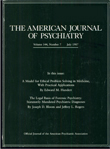AJP nov97 Book Forum Seminars in Liaison Psychiatry
Seminars in Liaison Psychiatry is intended to help trainee and general psychiatrists become acquainted with the basic approach of liaison psychiatrists in the general hospital setting. The foreword reveals that the book is one of many in the College Seminars Series published by the Royal College of Psychiatrists, which plays a key role in the education of psychiatrists and the development of professional standards in Great Britain. The College Seminars Series is “intended to help junior doctors during their training years.” The book's title refers to liaison psychiatry, which is synonymous with our consultation-liaison concept in the United States. Seminars in Liaison Psychiatry is not a textbook, but it serves as a synopsis of some important topics of consultation-liaison psychiatry. It covers a broad range of clinical, educational, and administrative issues.
The chapter entitled “Basic Skills,” by the editors, is one highlight of the book. It begins with a relevant description of skills that psychiatrists must develop for successful practice in the general hospital setting. The authors remind us that consultation-liaison practice involves complex medical and psychiatric assessments. Treatment occurs in a setting not specifically designed for psychiatric care, must take into account comorbid conditions, and must meet the needs of patients, staff, and physicians. Difficulties that trainees encounter in this setting are clearly reviewed in a table for quick reference. Basic guidelines for conducting a consultation are also outlined in a table. The authors helpfully address a few difficult areas of assessment: depressive symptoms in the physically ill, the relationship between depression and physical illness, and psychological disorders that present with somatic symptoms. Case vignettes diversify the presentation of these issues.
Two chapters are outstanding reviews of key topics of consultation-liaison psychiatry. In “Somatisation, Somatoform Disorders, and Factitious Illness,” Christopher Bass and Michael Murphy review the concept of somatization and its relationship to DSM-IV and ICD-10 disorders. The work of Briquet, Freud, Goldberg, and other medical anthropologists is discussed for the reader to grasp the functions of somatic symptoms. Childhood experiences, genetic factors, pathophysiological mechanisms, social factors, and cognitive factors of etiology and pathogenesis are cogently described. One highlight of this chapter is the section on assessment, which provides an excellent step-by-step approach for trainees to follow, replete with a case history to illustrate technique. The management section is brief but skillfully delineates principles of engaging and preparing the patient for treatment, as well as predictors of response to treatment. Another outstanding chapter is “Psychological Reactions to Physical Illness,” written by Peter Maguire and Peter Haddad. Patients' reactions to the diagnosis and treatment of illness are described, as are the common psychiatric illnesses from which they suffer. The authors outline patient and physician barriers to disclosure of emotional problems, along with approaches to reduce key concerns of patients. These two will quickly inform the trainee of both the philosophy and day-to-day management of the disorders.
Several other chapters are brief but helpful reviews of common consultation-liaison psychiatry issues. Drs. Sharpe and Peveler summarize the practical management of patients with suicidal ideation (or who have attempted suicide), alcohol and drug abuse, and eating disorders. Drs. Klein and Lask have written a thoughtful chapter on the nuances of managing child patients and their families. A chapter about work with older adults raises important questions regarding the interface of geriatric medicine and psychiatry, in terms of how best to collaborate and to provide care. The final chapter provides trainees a glimpse of research opportunities in this area of psychiatry, including studies of the cost-effectiveness of interventions.
A few things could be modified for subsequent editions or similar works in the future. First, to complement the discussion of the consultation role, a chapter would be helpful on the clinical, educational, and administrative aspects of the liaison role. Second, it would be helpful to compile certain topics at the beginning of the book: the introduction, epidemiology of disorders, nosological issues, and methods for identification of disorders. Then, it would be natural to proceed with the diagnosis and management of specific disorders. Third, the book could provide more information on key topics in dealing with patients in the hospital setting, such as the mental status examination, delirium, the management of agitation, and the management of depression and anxiety. Fourth, more emphasis could be placed on outpatient services, because changes in the delivery of health care are shifting care to that sector. With a few changes in the subsequent edition, this work could serve as an excellent synopsis of consultation-liaison psychiatry.
In summary, Seminars in Liaison Psychiatry is a useful addition to the literature on consultation-liaison psychiatry. It helps trainees and general psychiatrists become acquainted with the basic approach of liaison psychiatrists in the general hospital. It reviews the fundamentals of assessing patients who present with psychological and/or somatic symptoms. It succinctly summarizes the management of common psychiatric disorders in medically ill patients. Seminars in Liaison Psychiatry serves as a synopsis of some important topics of consultation-liaison psychiatry.



